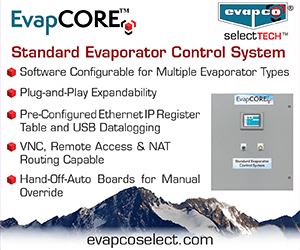Never Stop Learning

I have also met some people whose outlook and attitude has been puzzling. Here are a few examples:
In the mid-1980’s I was doing field checking during construction of a “state of the art” large ammonia system for a new food distribution center.
The company that would own and operate this new facility had been operating smaller and much older ammonia facilities.
In meeting with the refrigeration person who would be responsible for the operation of this new ammonia system, I briefly reviewed what would be involved in this “new” system. I told this person about the two-stage system that would be used, which was different than what they had previously operated.
I explained that the rooms and areas of the facility would be a combination of flooded and liquid recirculation temperature controlled zones, and the entire refrigeration system would be controlled by a computerized system.
After my review I asked, “Do you have any questions I can help with?” The person looked at me and said, “Nope. I know ammonia.”
I was taken aback by that comment, and I thought to myself, “maybe I didn’t explain very well what this new system would be like, especially compared to what they had before.” The reality was that this person thought they already knew all there was to know about the operation of an ammonia refrigeration system, and they didn’t need additional help or information to “do their job.”
Ever met someone like this? As it turned out, once the system was up and running, it was only a few months before this particular person left the company.
That employee could have easily been an asset to the company, due to all of their past experience, but they were not willing to learn, and move forward as things changed.
In another ammonia refrigeration facility, several different people were brought in to analyze what could be done to reduce the ever growing energy cost of the system operation.
Several different ideas were suggested. These included: use of frequency drives for condensers and ammonia pumps; addition of auto purgers; lowering of condensing pressure; increasing suction pressure; modifying line sizes where appropriate to reduce pressure losses, and others. Several of these suggestions were taken, however, the one that would make the largest impact on energy use . . . increasing the suction pressure, was not.
Over many years the refrigeration operators found it much easier to just set the suction pressure low and let the system run.
Sound familiar? This method didn’t cause much concern in the past, only because energy cost was low. Now this type of operating procedure was having a significant impact on the facility profit due to much higher energy costs.
At yet another facility, the management had learned a small amount about the OSHA “Process Safety Management,” and EPA “Risk Management Program,” but chose to ignore these plans. The first time EPA visited the facility they found nothing in place, which resulted in a large fine and some legal discussions.
It was agreed with EPA that steps would be taken to put the programs in place. The head of refrigeration – along with a few other people – implied “We know how to do this. No problem,” and proceeded to put together what little they understood about all of the elements of these programs.
The next time EPA came to visit, I had the opportunity to sit in on the review of the program that had been developed.
I was surprised by what had and had not been put together, and I wondered, “how can this program be acceptable?”
I wasn’t the only one with these thoughts. The head of the EPA inspection team was also amazed at what had not been accomplished, especially since the company had agreed in a legal settlement with EPA to get the program(s) properly developed and in place.
The “We know how to do this. No problem,” attitude didn’t work, and another large fine was given.
Soon after this meeting, the head of refrigeration found it wise to seek employment opportunities elsewhere.
What happened? Those who said they knew what to do, didn’t.
Nor did they take any proactive steps to learn about the requirements of these programs, nor did they look to obtain qualified help to assist in development of all of the program elements.
Several years ago at one of the IIAR Conferences, there was a very interesting speaker, named Sam Geist.
In one of his recent updates in his “Quick bites” website, a message stated: “Change is continuous. Improvement is continuous. Execution is continuous. No beginning, no end.”
No one is ever too old or too young to gain new knowledge. As much as we humans don’t like change, change will happen.
It is important that we stay in touch with what is happening in our industry. Some past methods may still be appropriate for ammonia refrigeration systems.
But there are continual advances in material science, in equipment design, in control methodologies, and in regulations.
We should be willing to continue to learn, to advance our knowledge, our understanding, our abilities, as well as keep us, the public and the environment safe.
Again, there are many very knowledgeable people in the ammonia refrigeration industry. You may be one of them.
One of the important things these people do to stay on top of their game is to take the opportunity to be involved in organizations where they can both learn, and help others to learn. For myself, being involved in IIAR for many years I have learned not only by attending technical presentations, Workshops, Panels, and exhibitions at the annual IIAR meeting, but also from participating in various committees and task groups. In addition I have met and learned from some of our industry’s best leaders. You can too.












